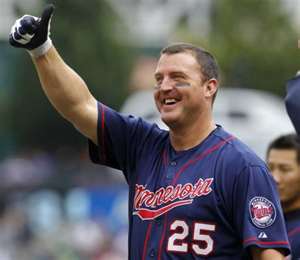 Let's get this out of the way up front, shall we?
Let's get this out of the way up front, shall we?
Jim Thome is the single nicest guy to ever don a Major League Baseball uniform. End of story.
No one I've ever heard speak of the man has ever said anything less. He's a great teammate, a wonderful role model, and an amazing ambassador for a game he loves like few players alive today.
And, frankly, if your daughter were to bring her new boyfriend home some night to meet the family, and that new boyfriend happened to be Jim Thome, you'd be giddy with delight.
Come to think of it, if you were ever in a foxhole pinned down by enemy fire, Jim Thome might just be the one guy you'd want in there with you.
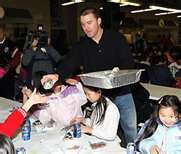 (And, frankly, I'm not so sure that if we didn't just hand this whole national debt mess over to Jim Thome, he might not be able to balance the books some afternoon in between cuts in the cage.)
(And, frankly, I'm not so sure that if we didn't just hand this whole national debt mess over to Jim Thome, he might not be able to balance the books some afternoon in between cuts in the cage.)
But that said, now that Jim Thome has finally hit his 600th career home run, and now that he's being steadily (and to a certain extent, casually) referenced by many as a "Future Hall of Famer," I find myself just a trifle unsettled.
Because, really, at the end of the day...is he?
I mean it. Does Jim Thome really belong in Cooperstown, and is he really a Hall of Famer?
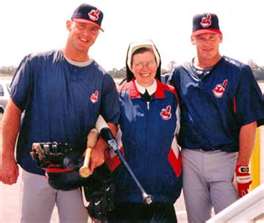 Look, he may well be. He may be Cooperstown-worthy as sure as I'm sitting here in desperate need of losing 20 lbs. And five years from the very instant he retires he may, indeed, garner enough votes for enshrinement.
Look, he may well be. He may be Cooperstown-worthy as sure as I'm sitting here in desperate need of losing 20 lbs. And five years from the very instant he retires he may, indeed, garner enough votes for enshrinement.
But in all honesty, from where I sit, and every time I look at him -- and this has been the case now for the better part of two decades -- I see a really good guy and a great human being. But I also see slow, plodding and defensively bereft player who between the lines does one thing and one thing only at a Hall of Fame level.
He hits home runs. That's it.
Keep in mind, we are talking about the National Baseball Hall of Fame here, right? The highest honor one can afford a baseball player in this country, short of maybe putting him on a postage stamp or petitioning him for sainthood?
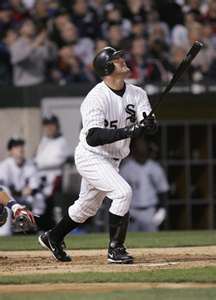 And for that reason, shouldn't it take more than a bunch of home runs -- even an ungodly number of home runs -- and exceptional table manners to merit enshrinement into such a hallowed place?
And for that reason, shouldn't it take more than a bunch of home runs -- even an ungodly number of home runs -- and exceptional table manners to merit enshrinement into such a hallowed place?
And before you come back with, "Yeah, but 600 home runs?", take a moment to chew on a few of these rock-hard little kernels of truth:
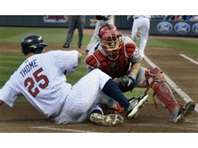 For years, Thome has been considered among the slowest and least dangerous baserunners in all of baseball, and his career averages of roughly one stolen base per year and one triple per year do little to dispel that notion.
For years, Thome has been considered among the slowest and least dangerous baserunners in all of baseball, and his career averages of roughly one stolen base per year and one triple per year do little to dispel that notion. A week or so prior, in the League Championship Series against Baltimore, Thome was not in the lineup in either of the games started by lefty Jimmy Key. And in the four games started by Oriole righties Mike Mussina and Scott Erickson, he went 1-14, leaving him at just .071 for the series.
A week or so prior, in the League Championship Series against Baltimore, Thome was not in the lineup in either of the games started by lefty Jimmy Key. And in the four games started by Oriole righties Mike Mussina and Scott Erickson, he went 1-14, leaving him at just .071 for the series.But of all the numbers that fuel my gnawing sense that Jim Thome is (or was) a good ballplayer, but not a Hall of Famer, one speaks louder than all the others.
Five.
Five. As in the number just after four, and the one just before six.
Five. As in the number of All Star teams Jim Thome made in his career.
Chew on that for a moment.
Five measly All Star games in a career spanning nearly a quarter of a century.
That's incredible. That a guy with over 600 home runs and nearly 1,700 RBI could be named to only five All Star teams? Because let's be honest, Major League Baseball hands out All Star roster spots the way ushers hand out playbills.
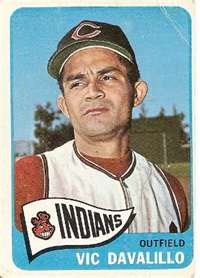 Vic Davalillo played in an All Star game.
Vic Davalillo played in an All Star game.
Bo Diaz played in an All Star game.
Mike Sharperson played in an All Star game.
Ron Coomer and Jose Offerman played in an All Star game. (In fact, the same one, in case you were wondering.)
Hell, Max Alvis played in two All Star games. So did Craig Reynolds and Kevin Seitzer.
And Tom Tresh -- in what remains one of the great mysteries of modern man -- somehow played in three of them.
In fact, the number of non-Hall of Famers (many of them far more complete ballplayers than Thome) who appeared in more than five All Star games is downright staggering.
Bill Freehan? Remember him? Good-hitting, tough-as-nails catcher for the Tigers during the days of Mickey Lolich and Denny McLain?
Eleven All Star games.
Steve Garvey? Square-jawed first baseman for Tommy LaSorda and those disco-era Dodgers ? You know, the guy with the Pepsodent smile, the perfect hair, and those freaky-big Popeye forearms?
Ten All Star games.
Ron Santo, Elston Howard, and Fred Lynn?
Tony Oliva, Lance Parrish and Ted Simmons?
Eight each.
And consider just some of the players -- non-Hall of Famers, every one of them -- who somehow found themselves named to seven All Star teams: Dale Murphy, Reggie Smith, Roger Maris, Tim Raines, Al Oliver, Thurman Munson, Dick Allen, Dave Parker and Ken Boyer.
And there's even more at six, including such solid-but-hardly-timeless names as Rocky Colavito, Moises Alou, Sandy Alomar, Ron Cey, Bobby Grich, Kenny Lofton, Alan Trammel, Bobby Bonilla and Rusty Staub.
So you can see that...
Wait. What?
Bobby Bonilla?
Did you just say Bobby Bonilla?
And...Rusty Staub?
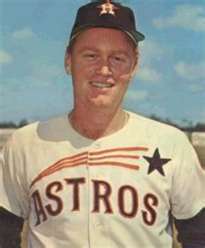 I'm sorry, are you telling me that Bobby Bonilla and Rusty Staub each played in six All Star games? Or one more than Jim Thome?
I'm sorry, are you telling me that Bobby Bonilla and Rusty Staub each played in six All Star games? Or one more than Jim Thome?
That's exactly what I'm saying.
In fact, in researching this essay I was stunned to learn just how many talented, effective, but in the end, largely forgettable major league ballplayers have been named to more than five All Star teams.
So why am I placing such emphasis on a game that for years was nothing more than an exhibition?
Because, think about it. For all its flaws, there is a certain genius to the All Star selection process -- not to mention something of a built-in hedge against bias and oversight.
If a player doesn't get voted in by the fans (who, admittedly, every year show a nagging tendency to vote for the most popular players from the biggest markets, as opposed to the most deserving ones), there is always the system of checks-and-balances known as the manager's selections.
And it is during this far-less-emotional and somewhat-less-subjective part of the selection process that a lot of fan sins get corrected and a lot of potential All Star injustices get yanked out by the roots.
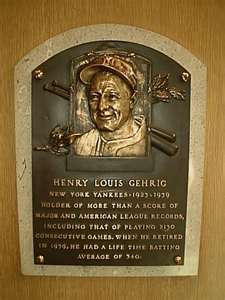 And while every year a few otherwise deserving, would-be All Stars continue to get left out in the cold -- and while I suppose it's always possible that any one season could result in something of a statistical hiccup -- make no mistake; 21 years are still 21 years. And over the course of that many summers' worth of fan balloting and manager decision-making, such things as quirks, hiccups and other statistical oddities have a way of finding themselves ironed out.
And while every year a few otherwise deserving, would-be All Stars continue to get left out in the cold -- and while I suppose it's always possible that any one season could result in something of a statistical hiccup -- make no mistake; 21 years are still 21 years. And over the course of that many summers' worth of fan balloting and manager decision-making, such things as quirks, hiccups and other statistical oddities have a way of finding themselves ironed out.
Twenty-one years' worth of All Star game selections is, in other words, a pretty accurate measure of how a player and his abilities were perceived by the fans of his era, as well as valued by the guys who know the game best: the league's managers.
That's why when one looks at Jim Thome, with his five All Star selections, and compares him to other players with that exact same number, what suddenly comes into focus is his place in the hierarchy of baseball legends.
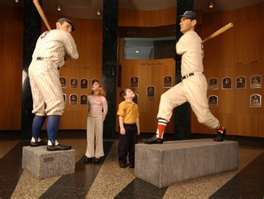 Jim Thome may have been a very good player, even a great one. But I'm sorry, he is not a Hall of Famer. And his name does deserve to mentioned alongside those of perennial All Stars like Hank Aaron, Ted Williams, Willie Mays, Roberto Clemente, Joe DiMaggio or Babe Ruth.
Jim Thome may have been a very good player, even a great one. But I'm sorry, he is not a Hall of Famer. And his name does deserve to mentioned alongside those of perennial All Stars like Hank Aaron, Ted Williams, Willie Mays, Roberto Clemente, Joe DiMaggio or Babe Ruth.
Nor, frankly, does he even deserve to be mentioned alongside annual, rite-of-summer guys like Willie Stargell, Willie McCovey, Yogi Berra, Eddie Mathews, Cal Ripken, or even Gary Carter.
My sense is, Jim Thome should be remembered in much the same way we remember so many others like him; talented and terrific players who earned a spot on exactly five All Star teams. Guys like Cecil Cooper, Keith Hernandez, Norm Cash, Joe Carter, Buddy Bell, Bobby Murcer, Tim Wallach, Amos Otis, Andres Galarraga, George Foster, Lou Whitaker, Maury Wills, Larry Walker, Frank White and Tony Pena.
Good players all -- very good ones, in fact -- just not Hall of Famers.
Sure, Thome was a better home run hitter than every one of those other five-time All Stars. But I'll go to my grave believing that every one of those guys was a better all-round player than Thome -- and in the case of Keith Hernandez, Larry Walker and Joe Carter, better by a considerable margin.
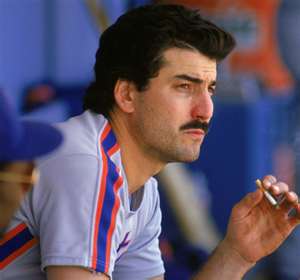 In fact, if you were trying to win 162 real-life baseball games played over the course of a six-month, real-life Major League season, followed by a best-of-seven, real-life World Series -- as a opposed to, say, some computer-based fantasy version of the game -- you could make a case for picking every guy listed above at the peak of his ability and in the prime of his career, over the one-dimensional Thome at the peak of his.
In fact, if you were trying to win 162 real-life baseball games played over the course of a six-month, real-life Major League season, followed by a best-of-seven, real-life World Series -- as a opposed to, say, some computer-based fantasy version of the game -- you could make a case for picking every guy listed above at the peak of his ability and in the prime of his career, over the one-dimensional Thome at the peak of his.
Especially given the horribly bloated numbers that dominated the era in which he played.
Will Jim Thome make the Hall of Fame?
I have no doubt.
After all, we're now officially a society in which, rather than singling out, honoring and motivating our best and brightest, we'd rather slow down the entire train to make sure that no child got left behind and that every kid somehow got a trophy.
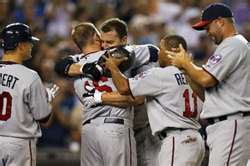 So yes, someday Jim Thome and his mostly middling numbers will eventually gain entry into the Hall of Fame.
So yes, someday Jim Thome and his mostly middling numbers will eventually gain entry into the Hall of Fame.
And part of me will be absolutely delighted when that happens. Because, after all, if you're going to exclude a handful of numbers-worthy Hall of Famers like Pete Rose on the basis of character, then you also have to make allowances for guys on the opposite end of the spectrum. Remarkably kind, gentle and decent men who just happen to have also been great ballplayers -- guys like Jim Thome and Dale Murphy.
But on the same token, another part of me -- that unrelenting baseball purist part of me -- will die just a little too. Because I've always felt, and I still do, that the Hall of Fame should be reserved for only the best of the best. Something Thome never was, nor ever will be.
Without question.
A great man?
Ask anyone who knows him.
But one of the greatest baseball players of all time?
Not by a long shot.
Why?
Because, as 21 years of All Star games will attest, Jim Thome was barely one of the greatest baseball players of his time.

Very interesting piece here. It's always thought-provoking to hear well-supported arguments that go against the popular grain. While I generally support Thome's Hall of Fame candidacy, I agree that he'd be a lower-tier member of the Hall.
I think it's fair to point out that Thome did do one other thing exceptionally well besides hit home runs: draw walks. Even though he couldn't run, as you said, having a slow runner on base is more likely to help you score a run than no runner on base and one more out.
It's very interesting how the perceptions of Thome have changed over the years. I remember the '90s, when Thome was part of Cleveland's slugging juggernaut. He seemed like just a strong cog in the machine, not an individually great player. Of course, that was the homer-crazy era, when several great hitters were overshadowed by guys putting up unreal numbers. It wasn't until Thome's monster seasons in 2001 and 2002 that he really started coming across as an elite player. At least, that's how I remember it.
I think there's something to be said for Thome's longevity. If you have an exceptional player who can't stay on the field and a very good player who's more durable, you'll get more value in the long run from the very-good durable guy. When looking at Thome's career as a whole, that how he comes across: a durable guy who most of the time was very good, and occasionally great. Over time, it added up to a pretty noteworthy career, even if it won't put him in many "all-time best" discussions.
I guess overall I'd probably put Thome in the Hall, but I do think it's good to be realistic about where he stands compared to other Hall of Famers.
Ian: I thought about Thome's walks and the whole OBP thing while writing this. And while Thome did indeed draw more than his share of walks, I'm not sure a guy with a high OBP should be given any greater Hall of Fame consideration than a high BA guy, like Matty Alou or Harvey Kuenn should.
The author of this piece is the most moronic IDIOT to ever write anything. What an stupi laced piece of CRAP!
Hey Yaggazoozy... please clarify "What an stupi laced"... no, on second thought don't. Before you call someone a moronic IDIOT- pls see your face in mirror.
M,
Don't forget, Biff Pocoroba made 1 All-Star team !
Carm: And he should have made plenty more!!! Johnny Bench this, and Johnny Bench that...blah, blah, blah.